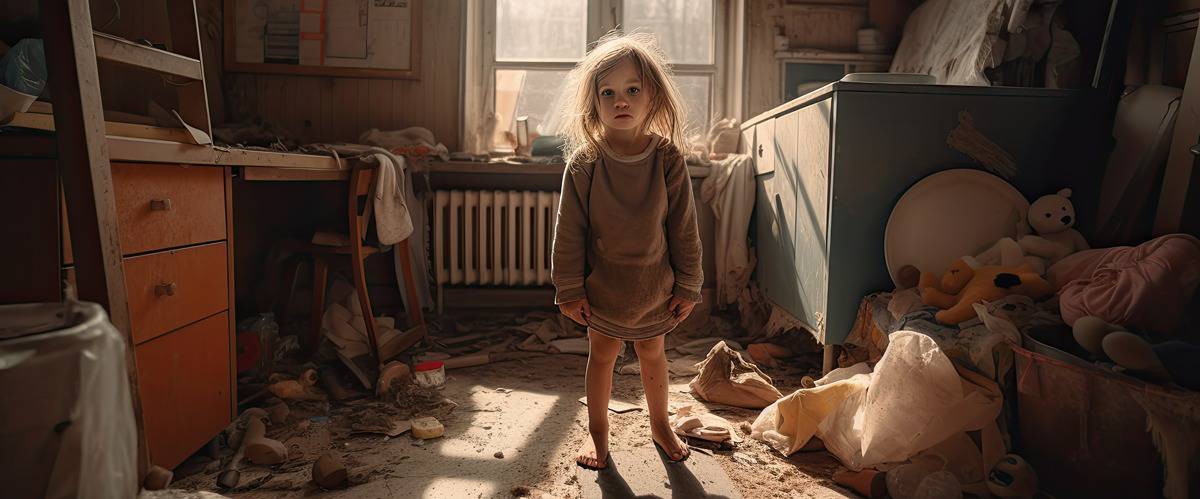Listen To This Page:
Quick Navigation:
- The Best Interests of the Child: A Central Principle in Custody Disputes
- What Does it Mean For a Parent to be Unfit?
- Evaluating Factors of Unfit Living Conditions in Child Custody Cases
- Documentation and Evidence: Building a Case of Unfit Living Conditions
- The Role of Child Protective Services (CPS) in Assessing Living Conditions
- Witnesses in Child Custody Disputes: Who Can Testify?
- Expert Witnesses: Psychologists and Social Workers in Custody Cases
- The Role of the Court-Appointed Advisor in Arizona Custody Cases
- The Impact of Domestic Violence on Child Custody Rulings
- Understanding the Consequences of a Parent Being Declared ‘Unfit’
- Legal and Physical Custody: Different Aspects Impacted by Unfit Living Conditions
Navigating child custody disputes is a complex and emotional process. The stakes rise significantly when there’s a concern about unfit living conditions.
Under Arizona Revised Statutes, the court makes every effort to rule in the child’s best interests, and an environment detrimental to their well-being could lead to modifications in custody agreements.
Interestingly, according to the Arizona Department of Child Safety, there were over 13,400 reports of child neglect in Arizona in 2020, a significant portion of which were due to unfit living conditions. As concerning as these numbers may be, they highlight the critical role of family lawyers and authorities in ensuring child safety.
Determining parental fitness involves a comprehensive evaluation of potential risks to the child, such as a history of abuse, substance abuse, or mental health issues. Living conditions, the child’s preference, and the parent’s work commitments also influence the court’s assessment. In cases of alleged unfit living conditions, substantial documentation and evidence are critical.
Child Protective Services (CPS) plays an integral role in these evaluations, with their findings potentially pivotal in court rulings. Additionally, various witnesses, including expert professionals like psychologists and social workers, provide insight into the child’s needs and the parent’s capacity to fulfill them.
The consequences of a parent being deemed ‘unfit’ can lead to a child being removed from their care, potentially affecting the parent’s legal and physical custody rights. The parent may face the requirement to undertake specific actions to remedy the issues that led to their ‘unfit’ status.
Colburn Hintze Maletta stands ready to assist individuals navigating child custody challenges, offering expert legal guidance grounded in a thorough understanding of Arizona family law and custody regulations.
Get Immediate Help from Our Family Law Attorneys.
We are Available to Talk Now.
Or, Continue Reading Below About:
Proving Unfit Living Conditions in Child Custody Cases
The Best Interests of the Child: A Central Principle in Custody Disputes
In any parent custody dispute, the Arizona court’s primary concern is always the child’s best interests.
As outlined under Arizona Revised Statute 25-403, the court considers various factors to determine this, including the child’s adjustment to their home, school, and community, the mental and physical health of all individuals involved, and which parent is more likely to allow the child frequent and meaningful contact with the other parent.
However, if the court finds that a child’s physical, mental, or emotional health is jeopardized due to unfit living conditions, it can significantly affect the custody agreement.
In such scenarios, the court may modify custody or limit visitation rights to protect the child.
What Does it Mean For a Parent to be Unfit?
When the court evaluates parental fitness for child custody, it takes into consideration a variety of factors. Seating one parent as ‘unfit’ could result in the other parent obtaining custody.
The following components often play crucial roles in the court’s decision:
- Child Abuse Record: Any parent with a track record of mistreating their children will likely face significant hurdles during custody proceedings. Courts rarely favor such parents, and they may only be granted limited visitation rights, if any.
- Substance Abuse History: Parents with past addiction struggles must demonstrate sustained sobriety and dependability to secure custody rights. Repeated relapses could lead the court to question their reliability and potential threat to the child’s safety.
- Domestic Violence Background: Courts take allegations of domestic violence very seriously. Evaluators will investigate whether the child has been exposed to such violence and scrutinize every claim closely.
- Capacity for Age-appropriate Decisions: Courts need to ascertain whether a parent can make sensible and age-appropriate decisions for the child, covering areas such as curfews, friendships, independent activities, employment, religious practices, and media access.
- Parent-Child Communication: The court seeks evidence of a healthy relationship between the parent and child. This includes the parent’s ability to understand and respond to the child’s needs and behavioral changes.
- Mental Health Issues: Unstable or aggressive mental health disorders in a parent could be deemed as potential risks to children. Evidence of therapy, counseling, medication, and other mental health treatments can help establish the parent’s suitability.
- Living Conditions: If parents are living separately, the evaluator will need to inspect the living conditions of both homes to determine their suitability for the children.
- Child’s Preference: In some instances, the child’s wishes might be considered, especially for those above 12 who can clearly express their thoughts.
- Parent’s Work Schedule: Parents with demanding work schedules, unusual hours, or frequent out-of-town trips may be unable to offer their child adequate supervision or quality time. The court will want to see a willingness to relocate or alter jobs to ensure a stable home environment for the child.
Evaluating Factors of Unfit Living Conditions in Child Custody Cases
Unfit living conditions can be evaluated through a variety of factors. In the state of Arizona, the primary focus is on any conditions that would impede the child’s safety or development.
Factors can include the following:
- Insufficient food or water
- Lack of medical care
- Lack of a safe and clean living environment
- Exposure to dangerous elements such as weapons or illicit substances
The court also considers the stability of the home environment. Constant disruptions or unpredictable living situations can negatively impact a child’s mental and emotional well-being.
An unstable home, frequent relocations, or exposing the child to inappropriate adult behaviors can all indicate unfit living conditions.
Documentation and Evidence: Building a Case of Unfit Living Conditions
Building a solid case requires substantial documentation and evidence.
Photos of the living environment, medical records of injuries or illnesses related to the conditions, and testimonies from teachers, neighbors, or family members, can all contribute to a solid case.
Parental behaviors that negatively impact a child can also serve as evidence. If documented, instances of neglect, abuse, or substance misuse can significantly sway the court’s decision. The parent wishing to modify custody due to unfit conditions must present compelling evidence to convince the court of the immediate danger posed to the child.
The Role of Child Protective Services (CPS) in Assessing Living Conditions
Child Protective Services are crucial in assessing a child’s living conditions. CPS will investigate if a report about a child’s unsafe living environment is filed.
Their findings can substantially influence the court’s ruling on a child custody case.
Their assessment includes thoroughly examining the home and interviews with the child, the parents, and other individuals in close contact with the family.
They aim to determine whether the allegations of unfit living conditions are substantiated. If CPS verifies these claims, their reports can be decisive in custody disputes.
Witnesses in Child Custody Disputes: Who Can Testify?
In child custody disputes involving unfit living conditions, the court considers testimonies from various witnesses.
Depending on their age and maturity, these can include teachers, coaches, neighbors, relatives, and sometimes even the child themselves.
These witnesses can provide insight into the living conditions and the child’s well-being, adding weight to your case.
Having reliable witnesses who can speak objectively about their observed situations is critical. Their statements can corroborate other forms of evidence, giving the court a comprehensive understanding of the child’s environment.
Expert Witnesses: Psychologists and Social Workers in Custody Cases
When there is a custody dispute between parents, the involvement of expert witnesses such as psychologists and social workers is common. These professionals play a crucial role in providing valuable insights into the child’s best interests.
Psychologists assess the parents’ and the child’s mental health and psychological well-being, looking for any signs of emotional or behavioral issues that could impact the child’s welfare.
They conduct interviews and evaluations, analyze test results, and provide an expert opinion on the child’s attachment to both parents.
On the other hand, social workers focus on assessing the parent’s ability to meet the child’s physical needs.
They evaluate factors such as parenting skills, the home environment, and the parent’s ability to provide a stable and nurturing environment. Both psychologists and social workers provide impartial and evidence-based recommendations to assist the court in making informed decisions about custody arrangements.
Their professional expertise helps ensure that the child’s best interests are prioritized throughout the custody evaluation process.
The Role of the Court-Appointed Advisor in Arizona Custody Cases
Under Arizona Revised Statute §25-405, the court may appoint an advisor to represent the child’s interests in a custody case.
This court-appointed advisor investigates the case, conducts interviews, and makes a recommendation to the court regarding the child’s custody.
In situations involving allegations of unfit living conditions, the advisor plays a crucial role. They can access child welfare records, interview relevant parties, and visit their living environment.
Their comprehensive report can carry significant weight in the court’s final decision.
The Impact of Domestic Violence on Child Custody Rulings
In Arizona, documented domestic violence carries substantial weight in child custody rulings.
According to Arizona Revised Statute §25-403.03, if the court finds that a parent has perpetrated an act of domestic violence, it raises a rebuttable presumption that awarding that parent custody is not in the child’s best interests.
Suppose you’re seeking to modify custody based on this factor. In that case, it’s crucial to provide as much supporting evidence as possible – police reports, medical records, witness testimonies, or protective orders can all strengthen your case.
Understanding the Consequences of a Parent Being Declared ‘Unfit’
Understanding the consequences of a parent being declared ‘unfit’ is crucial to fully grasp the potential impact on the child involved.
When a parent is deemed unfit, they cannot provide a safe and stable environment for their child to thrive.This may be due to substance abuse, neglect, or domestic violence.
The immediate consequence of this declaration is removing the child from their home and placing them into the custody of a more suitable caregiver, such as a relative or foster family. This sudden separation can be traumatic for the child, as they may feel a sense of abandonment or confusion about why they are no longer living with their parent.
Furthermore, being declared unfit can have long-term ramifications for the parent-child relationship.
The parent may need counseling or rehabilitation to regain custody or visitation rights. Sometimes, the child may be permanently removed from the parent’s care.
It’s important to remember that these measures are put in place with the child’s best interests in mind.
Parents declared ‘unfit’ usually have opportunities to rectify the conditions that led to this declaration through compliance with court-ordered actions like counseling, parenting classes, or rehabilitation programs.
Legal and Physical Custody: Different Aspects Impacted by Unfit Living Conditions
When determining a child’s legal and physical custody, one crucial factor is the living conditions of each parent. Unfit living conditions can have a significant impact on both aspects of custody.
In terms of legal custody, which refers to the ability to make crucial decisions regarding the child’s upbringing, if a parent is living in an environment that is unsafe or unsuitable for the child, it may be deemed that they are not capable of making sound decisions in the best interest of the child.
This could result in the other parent being granted sole legal custody.
Regarding physical custody, which refers to where the child will reside on a day-to-day basis if a parent’s living conditions are deemed unfit, it may be determined that living with that parent is not in the child’s best interest.
In such cases, the court may award physical custody to the other parent or a third party that can provide a safe and suitable living environment for the child.
Overall, unfit living conditions can significantly impact both legal and physical custody outcomes.
How Colburn Hintze Maletta Can Assist in Child Custody Cases
Facing uncertainty surrounding child custody is undoubtedly overwhelming, but you don’t have to navigate the complicated legal process alone. At Colburn Hintze Maletta, we bring our extensive experience in Arizona family to your aid. We have a deep understanding of Arizona custody laws, which allows us to assist you at every step of the process.
If you or a loved one are facing child custody issues, don’t hesitate to ask for the legal support you deserve. Contact us at Colburn Hintze Maletta by dialing 602-825-2500.

David Maletta is a widely respected criminal defense attorney with over 23 years of experience and has worked on over 1,000 cases and has successfully won over 100 jury trials. David graduated from Northern Arizona University, Magna Cum Laude in 1993 with a degree in Psychology. Shortly thereafter, he earned his Juris Doctor degree from Seton Hall University School of Law in 1998. He has extensive experience in criminal and DUI matters, homicide, sexually-based offenses, domestic violence, white-collar crimes, and various misdemeanor crimes.
Always Available 24/7 for Legal Help
Schedule an Appointment Today!
Call Us Now to Speak with an Attorney (602) 825-2500
Real Client Reviews
Below are just a few of what our clients have to say!









